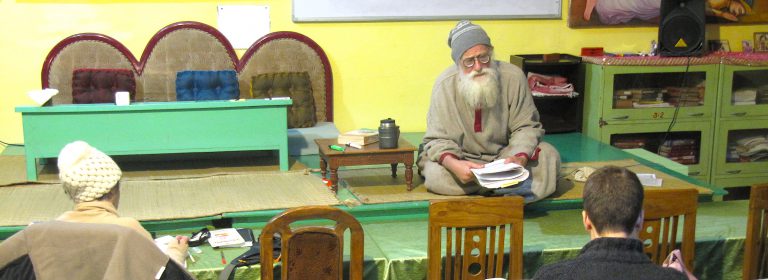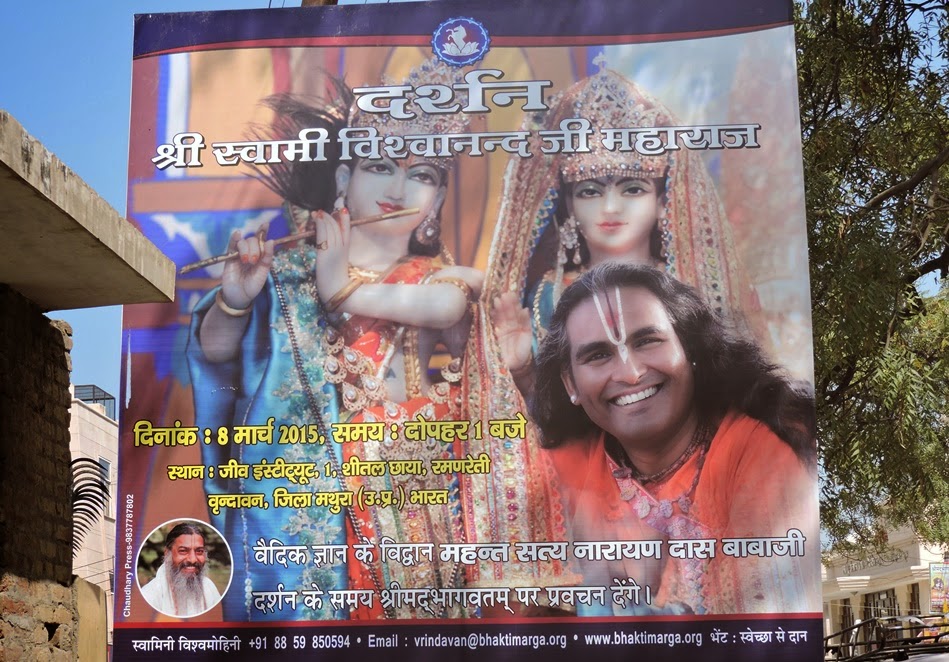Jiva Tirtha Sanskrit Progress Report
This has been a very good year for the Jiva Tirtha Sanskrit course and things are progressing quite nicely, though in the usually bumbling way.
This is the second year we have been doing this course at Jiva and it is still a work in progress. One student Stuart Trusty pushed to have the manual published in a small number after the first year was over. This year we have been able to build on that work and at the end of this year we should have a second edition.
Even so, I think it will take one more year before it will finally be publishable, as what I have learned this year will need to be better assimilated to the overall method.
By an interesting coincidence, one of my students this year is Vinode Vani Dasi. She was in Dallas in 1973, the first full year that the original ISKCON Gurukula was in operation. Like many things in ISKCON, the early days were the headiest, filled with the most enthusiasm. We had a rather good reminiscence about it in yesterday's class. The Gita memorization contest and the Krishna Book quiz games were two of the things that remained as very positive memories.
Many of the things I still do in the classroom come from the experience of trying to teach those children Sanskrit -- first Western kids in English, and then later at the Mayapur Gurukula in Bengali. Things like group chanting declensions before class, for instance. Memorizing verses.
And I did have a bit of experience also teaching at the university level, but not so much. Then teaching in Rishikesh. Each one of these experiences presented certain challenges that have led to an somewhat idiosyncratic approach to teaching Sanskrit, based really on speed -- getting the easy stuff first, try to understand the Sanskrit way of thinking.
Language is an operating system for the brain. If you follow George Lakoff you will understand how even a single language has different "programs". Prabhupada instilled in me a faith that Sanskrit represents a superior programming system because it inevitably leads to contemplation of the Absolute Truth. It orients the brain in frames (to use Lakoff's term) towards God. All knowledge and perception is reframed into a God-oriented narrative. For the yogi sadhaka, this is almost a compulsory prerequisite.
The desired goal is to be able to think in Sanskrit. If you start learning Sanskrit according to the model of thinking in Latin or French, you will never get very far.
Over the years, of course, DOING Sanskrit has always been more important (it seemed) than teaching it. But by Satyanarayana Dasa Babaji Maharaj's grace, an opportunity has been provided where serious students can apply themselves and it is my great good fortune that these students are tolerating my untidy teaching style and being persistent.
I am calling them my guinea pigs, but quite honestly, they are participating wholeheartedly and thereby helping the development of this course immensely. "Teach what you want to learn" is a truism. Really, it is great because it helps to get us to a place where more advanced concepts can be taught. And believe me that is a great relief!! It is a relief to be able to envision getting to the good stuff!!
Swami Veda told me back in the day when he first engaged me at Rishikesh that he knew it as university policy that one always hires the seniormost lecturer to teach the beginners. He may just have been trying to butter me up, but I think what he was getting at is that the person who has the most love for a subject will instill that love in his students.
So in a way it is not the Sanskrit language that the best teacher will instill in his student, but a love for Sanskrit.
It is very gratifying to feel that love being mirrored this year.
And, I will add, it will make this course really good next year. So I am already sending out a warning to all prospective students that next year may be the last year I do it. So take advantage if you can.
In a kind of coincidence, a friend of mine simultaneously posted a black and white video of Prabhupada speaking. This is where I first heard Sanskrit, in his quoted verses.
https://www.facebook.com/prabhupadavideos/videos/269189890129371/




Comments
Also, smilingly I say your beard makes you look increasingly Rishi-like!
My person started watching the black & white YouTube video you listed at the foot of your latest blog posting entitled “Jiva Tirtha Sanskrit Progress Report” in which you recommended watching a video of his holiness abhaya-caraṇāravinda bhakti-vedānta svāmī prabhupāda speaking, in which he said, quote:
“Khala means Jealous” (stop the video at 3 minutes and 14 seconds)
In the spirit of your blog posting Jagadananda Das on the progress of Sanskrit, let us examine the Sanskrit word ‘Khala’.
Page 338 of the Monier-Williams Dictionary describes the word as:
khala khála m. (n. g. ardharcâdi) a threshing-floor, granary RV. x, 48, 7 AV. ŚāṅkhŚr. &c
• earth, mould, soil L.
• place, site L.
• m. contest, battle Naigh. Nir.
• sediment or dregs of oil Pañcat. ii, 53
• (= khaḍa) butter-milk boiled with acid vegetables and spices Suśr. i, vi
• a mischievous man
Mṛicch. Cāṇ. BhP. Pañcat. &c
• the sun L.
• Xanthochymus pictorius (tamāla) L.
• the thorn-apple L.
• (ā), f. a mischievous woman Amar.
• N. of a daughter of Raudrâśva Hariv. VāyuP. ii, 37, 122
• (ī), f. sediment or deposit of oil Car. Bhartṛ. ii, 98
Furthermore, on the same page (page 338) the stem of this word is ‘khal’ (to move or shake, to gather [up]) which is from the root ‘khall’
Source:
http://www.sanskrit-lexicon.uni-koeln.de/cgi-bin/monier/serveimg.pl?file=/scans/MWScan/MWScanjpg/mw0338-kharbUja.jpg
My person writes here in the hope that when you teach Sanskrit to your chela, that the sacred truth is not lost in translation by teacher or student.
Kind regards,
M.N.
Notes
The threshing floor is the yogi's mat, and the winnowing basket is his pelvis
Jagadananda Das said: Language is an operating system for the brain. If you follow George Lakoff you will understand how even a single language has different "programs".
M.N. replied: When your Professor of Cognitive Science and Linguistics, George Lakoff said “I study the brain, the mind and language” my person switched off the sound file (it was a waste of time, he was too far gone), following Professor Lakoff, is like the "blind following the blind".
One must go beyond the mind and such false constructs (as language); the primordial being has no operating system...
Have you learned nothing yet?
WE ARE NOT MACHINES!
“A controlled language
as a tool to limit freedom
of thought, and concepts
that pose a threat to the
regime, such as freedom,
self-expression,
individuality, and peace.”
George Orwell (“New-speak” 1984)